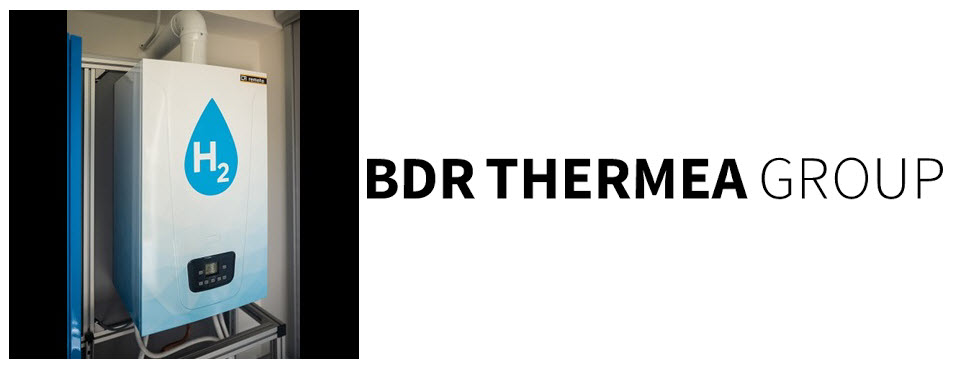
On 25th June, the world’s first hydrogen powered domestic boiler will be put into operation in a real life situation in Rozenburg, the Netherlands. The boiler had been developed by BDR Thermea Group, a leading manufacturer of smart thermal comfort solutions, whose mission is developing and producing heating and hot water solutions with virtually no Carbon Dioxide (CO2) emissions.
This ground-breaking boiler burns pure hydrogen that has been produced by wind or solar energy without releasing any CO2. Gas network provider Stedin, the company that has initiated the project, is responsible for the production and supply of the sustainably produced hydrogen.
This is the first real life situation in which pure hydrogen will be used to fuel a high efficiency condensing boiler to heat the central heating system of a residential building. The boiler has been developed by BDR Thermea Group’s Research and Development (R&D) competence centre in Italy. After the first pilot in the Netherlands, which is being carried out by the Group’s Dutch subsidiary Remeha, it is carrying out a larger scale field trial in the United Kingdom. New opportunities for projects in other European countries are now being explored as part of the broader, pan-European development of this technology.
Firmly committed to sustainability
“The development of a hydrogen boiler is part of BDR Thermea Group’s solutions for decarbonising heating. We currently offer a range of technologies, such as high efficiency gas boilers, heat pumps and heat networks, and now also hydrogen boilers and fuel cells. Sustainably produced hydrogen is an important, potentially very interesting energy carrier for the future”, says Bertrand Schmitt, CEO of BDR Thermea Group. “Power to gas (hydrogen) is an unavoidable and necessary technology if we want to store sustainably generated energy over a longer period of time, as abundant wind and solar energy is not always immediately available at times of greatest need, such as during the winter. With the new hydrogen boiler, along with our fuel cell appliances, we are firmly committed to making the built environment more sustainable.”
Exploring more pilots
“The operating principle of the hydrogen boiler is the same as that of a boiler running on natural gas”, says Peter Snel, CTO of BDR Thermea Group. “In the future, we will be able to exchange conventional gas boilers for hydrogen boilers on a like for like basis, provided the supply of hydrogen is available through natural gas pipelines. That is why co-operation with network operators is of crucial importance to BDR Thermea Group. In addition to the pilot in Rozenburg, we will also participate in a large-scale demonstration project in the United Kingdom. Over 400 hydrogen boilers will be installed over the next two years.
“We would like to invite other network operators and building owners in Europe to collaborate in field tests as well. In this way, the development of a CO2-free heat supply will be accelerated. This will also boost the production of sustainable, green hydrogen using wind and solar energy.”
Pilot at Rozenburg
The Dutch project in Rozenburg is a joint initiative with network operator Stedin, the municipality of Rotterdam and housing cooperative Ressort Wonen. The hydrogen boiler will be installed in a boiler room alongside an existing conventional natural gas boiler which will ensure that the residents have sufficient heat and hot water at all times. Stedin is using an existing regular pipeline to supply the hydrogen, demonstrating that the existing gas network is suitable for carrying hydrogen. In this project, Stedin and its partners are considering the entire chain of the future: the production, distribution and conversion of hydrogen, with the ultimate aim of providing zero-carbon comfort.
Unique project
Next to the Rozenburg apartment complex is the Power-To-Gas (P2G) testing ground. Various partners have been working together on new technologies here for several years. In the coming years, sustainable electricity will be converted into sustainable gas. Remeha (part of BDR Thermea) is working closely together with network manager Stedin and Woningstichting Ressort Wonen, among others, on this unique project to make hydrogen more sustainable.
Innovative power
The hydrogen is generated locally with green energy from a local windmill. This is transported via a local (gas) pipeline to the boiler house where the Remeha hydrogen central heating boiler provides heating for part of the apartments. This is the first time that a central heating boiler is fired on hydrogen and supplies the heat to an existing central heating system. Remeha’s Managing Director, Arthur van Schayk, commented on this: “A successful and affordable energy transition is based on this type of innovation. Together with the entire chain, we demonstrate what we are capable of and we demonstrate our innovative power. The Netherlands can use this knowledge and experience to heat our homes sustainably and comfortably. ”
The official start
On Tuesday afternoon, 25 June, the official starting signal for the Rozenburg pilot project was given to the P2G station for around 200 guests. Among the guests were the residents of the apartments and other stakeholders in this project, such as municipality, borough, press and management of the partners. The official start marks a special moment.
Without CO 2 emissions
Hydrogen is not an energy source, just as natural gas, wind and sun are. Hydrogen is a gas and an energy carrier. That means you can produce energy with it, you can extract energy from it. It is already widely used. The industry makes thousands of tons of hydrogen by splitting natural gas. For use in Rozenburg, hydrogen is produced by splitting water into oxygen and hydrogen. This is happening for the first time on this scale in a completely sustainable way, without CO 2 emissions .
Energy transition & Remeha
We are at the start of an energy transition. In the coming years we will switch from fossil fuels to sustainable energy sources and carriers. Gas-forming, electricity and heat networks jointly help to make sustainability and therefore reduce CO 2 emissions in the Netherlands. Remeha believes that the energy supply must be a mix in which there is room for different energy carriers, because there are several paths that lead to sustainability.
Read the most up to date Fuel Cell and Hydrogen Industry news at FuelCellsWorks




